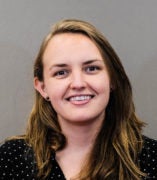
Andrea Bassett, PhD
Clinical Associate Professor
Biological Sciences
Contact
Building & Room:
4277 SELE
Address:
950 S. Halsted St.
Office Phone:
Email:
About
I am a Clinical Assistant Professor, which means I am a teaching professor. I develop curriculum, teach, and train graduate teaching assistants across various undergraduate courses in Biology. I am currently teaching BIOS 325 Human Embryology, BIOS 326 Embryology Laboratory, and BIOS 351 Microbiology Laboratory. My teaching goal is to bring these subjects to life: exploring the hidden history of our own development in the womb, and making the invisible world of microorganisms visible and understandable to students.
Human Embryology is a comprehensive survey of the major events of development. We begin with the generation of gametes, then trace the events of fertilization, cleavage, implantation, placentation, gastrulation, neurulation, and embryonic folding. From there we adopt a systems approach and explore the development of each major organ system from folding through birth. We study birth defects to understand the control mechanisms underlying development. We use clinical case reports, clinical scenarios, and research examples to test and apply our knowledge practically.
In Embryology Lab, we use histological sections to learn the ever-changing anatomy of embryos as they develop. Students learn to identify tissues from their microscopic appearance and mentally reconstruct 3-dimensional embryos from 2-dimensional sections.
Microbiology Laboratory trains students in common microbiological lab techniques. Students learn to isolate and culture biohazardous microorganisms safely in a lab environment. We use learning targets and skills assessments to articulate and measure growth in students ability to apply aseptic technique, use brightfield microscopy, prepare and interpret stained slides, perform and interpret metabolic assays, among other skills. Students apply their knowledge and skills to identify unknown organisms and develop scientific writing skills.
I supervise independent study and Honors Capstone projects that support students’ individual research interests. Some recent projects include therapeutic uses of dental stem cells, hormonal interactions in PCOS, effects of fixation method on Gram staining, and adverse effect of Caesarean section delivery on the gut microbiome. My pedagogical interests include course based undergraduate research experiences (CUREs) and mentoring and retention for first-generation students.
My prior teaching experience includes Cell Biology Laboratory, Vertebrate Embryology, and Genetics Laboratory. My past research experience focused on chromatin-based regulation of heart development. This work demonstrated new roles for two ASXL family proteins in regulating myocardial thickness, ventricular septum formation, and lung maturation.
Selected Publications
(Complete list of publications on Google Scholar)
- McGinley, AL, Li, YY, Deliu, ZD, and Wang, QT. (2014). Additional sex combs-like family genes are required for normal cardiac development. Genesis, 52(7): 671-686.
- Lai, HL, Grachoff, M, McGinley, AL, Khan, FF, Warren, CM, Chowdhury, SAK, Wolska, BM, Solaro, RJ, Geenen, DL, and Wang, QT. (2012). Maintenance of adult cardiac function requires the chromatin factor Asxl2. Journal of Molecular and Cellular Cardiology, 53(5): 734-741.
Education
PhD, University of Illinois at Chicago
BS, Marietta College
Denison University